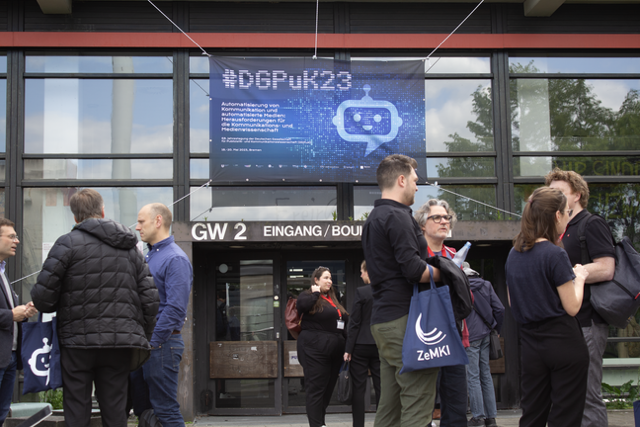
- Datum: 18. May 2023 – 20. May 2023
- Time: 16:30
- Street: Bibliothekstraße 1
- Location: Universität Bremen
The theme of the 68th Annual Conference of the DGPuK from May 18 to 20, 2023 in Bremen is Automation of Communication and Automated Media: Challenges for Communication and Media Studies.
The automation of communication and automated media stand for a fundamental transformation of the conditions and consequences of social communication: More or less “artificially intelligent”, media are no longer just mediating instances of communication, but are themselves becoming automated systems and participants in communication. The first concepts used to describe these developments are “communicative AI” or “communicative robots”.
The phenomena and examples that are captured by such terms are diverse. The role of bots and algorithmic personalization on social media platforms, for example in the spread of fake news and hate speech, is the subject of intense debate. Systems such as Amazon Alexa, Google Assistant and Apple Siri have the ability to communicate with people using spoken language. At the same time, the spread of such systems is closely linked to broad discussions about data (in)security, surveillance capitalism and data colonialism, but they also raise questions about the communication relationship between humans and machines.
Automation also plays an increasingly important role in journalism: journalistic working practices change when the automated generation of content – from simple forms of automated data preparation in data journalism to complex systems based on machine learning – becomes part of everyday life and thus requires new skills and roles. Chat bots are spreading in various areas of society, not only in computer games, but also in PR and organizational communication as well as in the communication of public institutions with their audiences. Automation remains contradictory in all of this: the curation of digital platforms, for example, is never only automated, but humans continue to play an important role here, especially when it comes to “fixing” communication conflicts. This again clearly shows where the limits of the automation of communication and automated media lie.
Overall, these examples point to how rapidly systems of automated communication have established themselves in society, how they have become part of our media environment and thus of domains, fields and systems such as the public sphere, journalism, politics and business, which have always been at the center of media and communication studies research. All of these are considerable challenges for communication and media studies: empirically, with regard to how automated communication and automated media can be appropriately understood; theoretically, because even previous basic concepts such as media and communication are being called into question.
At the 68th Annual Conference of the DGPuK, we will look at all of this from the broad perspective of communication and media studies. On the one hand, we are concerned with the systems of automated communication and human interaction with them. On the other hand, we are interested in the wider dynamics of (public) communication associated with these systems.
To the Call for Papers

